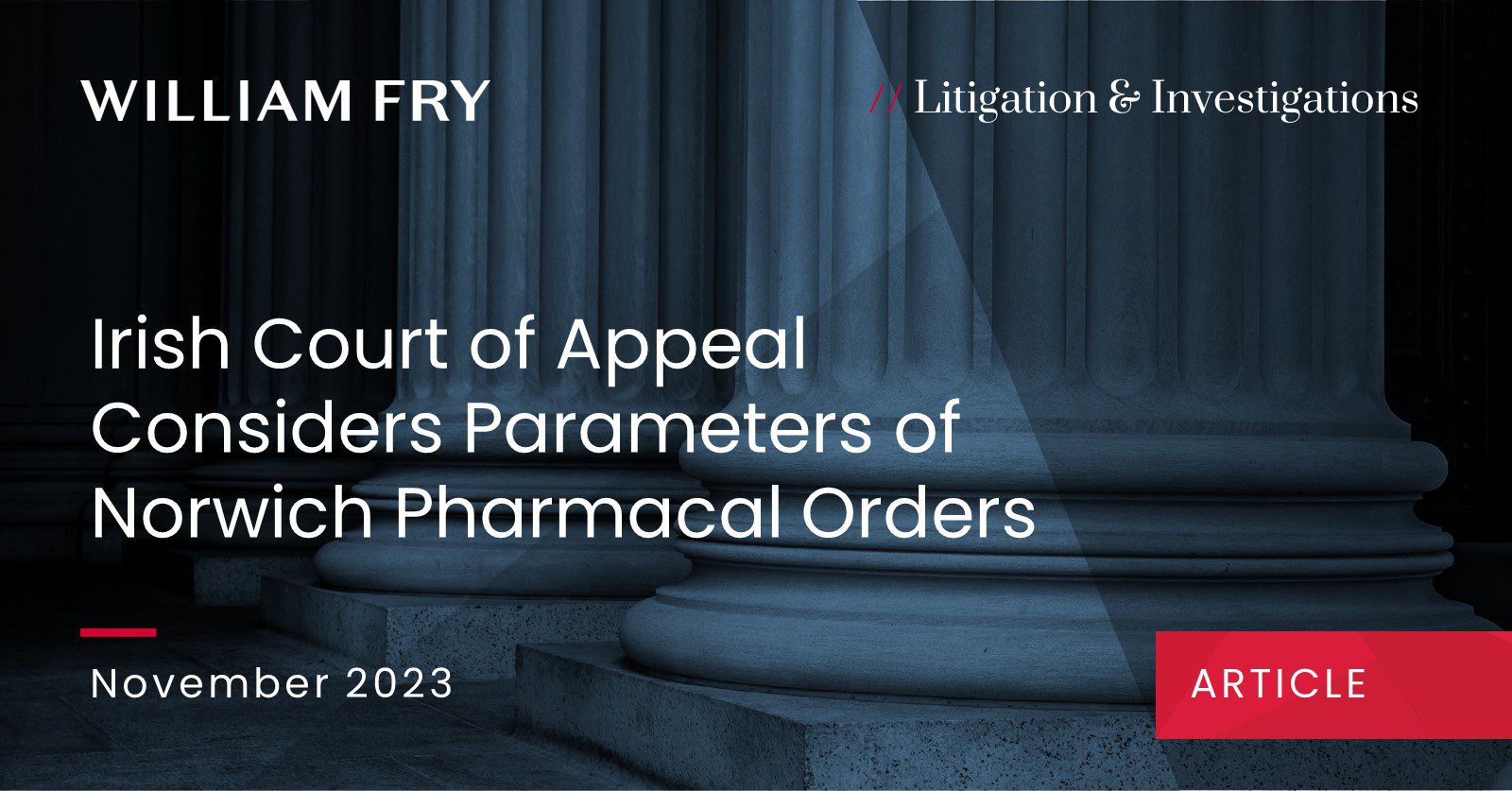We have previously written about the Norwich Pharmacal Order (NPO), which compels a party to disclose information to a plaintiff that would assist in identifying a third-party wrongdoer.
Previously under Irish law, a party seeking a NPO must establish a very clear and unambiguous case of wrongdoing (see Megaleasing UK Ltd v Barrett (No. 2) 1 I.L.R.M. 49). The archetypical Norwich Pharmacal (NP) applications are against innocent defendants, albeit one who is “mixed up” in the alleged wrongdoing of others. This means that disclosure obligations are often imposed on innocent parties against whom no claim of wrongdoing is made and affecting alleged wrongdoers who are not represented in court before the order is made. Therefore, safeguards must be applied. In a recent decision, the Court of Appeal (COA) had to grapple with the calibration and application of those safeguards.
In Blythe v Commissioner of An Garda Síochána [2023] IECA 255, the COA considered whether a court may order a party against whom no claim of wrongdoing is made, to disclose information to a plaintiff for the purpose of enabling that plaintiff to pursue legal action against a third party.
The High Court granted a NPO against the defendant requiring him to provide the plaintiff with the names and addresses of persons where the defendant considered that there was prima facie evidence that they were involved in the publication of defamatory allegations against the plaintiff. The disclosure was sought by the plaintiff to bring defamation proceedings against the persons responsible for the defamatory material. The defendant unsuccessfully objected on several grounds, including that there was no clear and unambiguous evidence of wrongdoing by the intended defendants.
The Appeal
After rejecting a preliminary application that the appeal was moot, the COA went on to consider the proper parameters of the NP jurisdiction.
The jurisdiction of the Irish court to grant a NPO is firmly established. Although it has its origins in a UK case, the principles applied by the UK differ from Ireland, in that the Irish courts are largely concerned with whether the applicant can establish wrongdoing against the defendant. In the UK, the courts apply a four-part test in deciding whether to grant the relief. After considering the UK and the Irish authorities in detail, the COA listed the principles to be applied by an Irish court when considering whether to grant a NPO.
1. The requirement to demonstrate wrongdoing – what is the relevant threshold?
The COA accepted that the applicant for a NPO must demonstrate that it has a cause of action against the alleged wrongdoer. However, the relevant standard of proof that applies was unclear.
The COA was not satisfied that the approach taken in the UK should be followed in this jurisdiction. In its view, a “good arguable case” threshold that generally applies in the UK to NP applications, is too low a bar and the adoption of such a standard would not be consistent with Megaleasing. Instead, the COA found that an applicant for a NPO must demonstrate that it has a “strong case” against the alleged wrongdoer. That threshold test is well-established in Ireland and according to the COA, its application is more predictable and certain than any threshold based on a “good arguable case”, “prima facie case” or “strong prima facie case”, the latter being applied in Irish NPO cases post Megaleasing. The “strong case” threshold requires the court to be satisfied that the applicant’s claim against the alleged wrongdoer is “likely to succeed at trial”.
2. Possession/Necessity
The COA held that a NPO should not be made unless the court is satisfied that the:
- information sought is likely to be in the possession of the defendant;
- information is necessary for the purposes of bringing court proceedings (or, to pursue some other legitimate remedy arising from the alleged wrongdoing); and
- applicant has no other practicable or more appropriate means of obtaining that information.
3. Discretion/Proportionality
The interests favouring disclosure must be balanced against those weighing against disclosure. There is no assumption that the NPO should be made merely because the court is persuaded that the plaintiff has a strong case against the alleged wrongdoer. The COA observed that as important as the right of access to the courts or the right to an effective remedy is, it may be outweighed by other considerations, such as privacy.
4. Duty of candour
The COA held that a duty of candour applies to applications for disclosure, even though they are not strictly ex parte applications.
5. Undertaking
The COA also held that a person obtaining disclosure under a NPO is subject to an implied undertaking like the implied undertaking that applies in the context of discovery. Such an undertaking could limit the use of the information disclosed to the prosecution of the intended proceedings.
6. Costs
The COA then went on to consider the costs in NPO applications. Costs are always a matter for the court, subject to the provisions of the Legal Services Regulation Act 2015 and Order 99 of the Rules of the Superior Courts. However, endorsing the comments of Simons J in Salesian Secondary School (Limerick) v Facebook Ireland, the COA found that the general rule is that the respondent should be entitled to recover their costs from the applicant, where the respondent is not itself a wrongdoer. The COA also held that where a respondent bona fide, unsuccessfully resists the making of a NPO, they ought to have their costs.
The future of NPO
The jurisdiction of the NPO in Irish law is evolving as more cases come before the courts. Notably, in a recent High Court decision (ESB & Anor v Richmond Homes & Anor [2023] IEHC 571), Dignam J extended the NP jurisdiction beyond disclosing the identity of alleged third-party wrongdoers, to include disclosure of dates and amounts of allegedly improper payments requested by and paid to those wrongdoers.
The COA judgment in Blythe provides helpful guidance around the court’s jurisdiction to grant NPOs. However, other issues remain unresolved as they did not arise for determination in the case. Issues such as whether an Irish court can make a NPO in aid of foreign proceedings, or statutory tribunals; or for purposes other than the institution of proceedings, which fall to be resolved in future litigation.
Further changes are imminent, as the Defamation (Amendment) Bill (Bill) proposes to introduce a statutory basis for NPOs in Irish law. Currently, NPOs are granted under the High Court’s inherent jurisdiction. The General Scheme of the Bill, which was published earlier this year (see our update here), proposes to allow the Circuit and High Court to make identification orders (NPOs) where a person has anonymously published a defamatory statement about the applicant. The Bill is included as priority legislation for the government in the current Oireachtas session. We will continue to monitor the Bill’s progress through the Oireachtas.
To discuss NPOs or any aspect of this article in more detail please contact Paul Convery, Adele Hall, Joanne Ryan or your usual William Fry contact.
Contributed by Gail Nohilly




